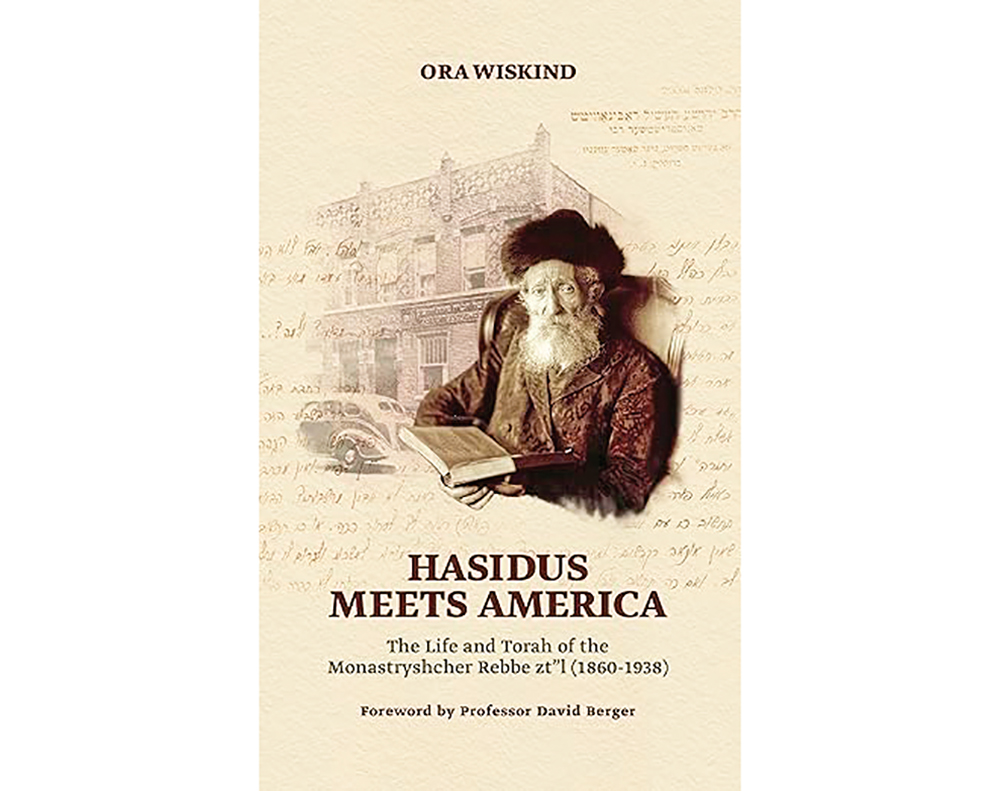
Reviewing: “Hasidus Meets America: The Life and Torah of the Monastryshcher Rebbe,” by Ora Wiskind. Ktav Publishing. 2024. Hardcover. 216 pages. ISBN-13: 978-1602805248.
If you Google “Rabbi Jonathan Sacks,” there are links to countless articles, audio clips, videos and more about the late, great chief rabbi. Do the same for “Rabbi Yehoshua Heschel Rabinowitz” and that will only return about 40 hits.
Rabbi Rabinowitz, who died in 1938, was a Hasidic rebbe renowned in his native Ukraine. His life story and Torah insights are brilliantly detailed in ”Hasidus Meets America: The Life and Torah of the Monastryshcher Rebbe” (OU Press) by Dr. Ora Wiskind of Ono Academic College.
While his story is not well known, this fascinating book changes that.
Rabbi Rabinowitz led about 30 Hasidic communities during his four decades in the Ukraine until he immigrated to the United States in 1924. While support for Ukraine is in the minds of many Americans today, Rabbi Rabinowitz was forced to leave there due to antisemitism, which included the murder of his son in a pogrom.
Waves of pogroms were initiated by units of the army of the Ukrainian People’s Republic, the White Movement and the Red Army. That, in addition to peasant insurgent movements, led to the genocide of hundreds of thousands of Jews who were attacked, maimed, morally degraded and murdered. It’s not surprising that Rabbi Rabinowitz referred to Ukraine in the most vitriolic of terms, including calling it “an accursed, bloodstained land.”
While there are now hotels in Uman where Jews stay in comfort and eat sumptuous meals, the Ukraine of Rabbi Rabinowitz’s time was one of starvation and deprivation.
During his sojourn in the United States, Rabbi Rabinowitz served as the president of the Organization of Hasidic Rabbis and won acceptance from the mainstream rabbinic establishment. He paved the way for many of today’s Hasidic dynasties. Rabbi Rabinowitz was born into Hasidic royalty, as he was a descendant of Rav Gedaliah of Linitz, a student of the Baal Shem Tov. He is not well-known among Americans as his son Rabbi Yaakov Meshulam Zusha who succeeded him as the Monastryshcher Rebbe left the United States and lives in Ramat Gan, Israel.
Here, Wiskind not only gives biographical insights into Rabbi Rabinowitz’s life but also shares many of his fascinating and original Torah insights.
One particularly insightful thought of his is in reference to the statement in Yevamot 47b, which says that “converts are painful as a leprous scab.” He answered this initially troubling statement in that converts, like Rabbi Akiva, grasp the Torah by its horns and thorns most of all. Thus, it is they who can reveal the mysteries held within them. Secrets that others cannot discover. This, of course, is terribly embarrassing for Israel. And thus, converts are as painful as a leprous scab.
Rabbi Rabinowitz laid the foundation for many of today’s Hasidic dynasties. While he is known mainly by a small number in the Hasidic world today, this wonderful book ensures that his legacy will live on among many more people.
Ben Rothke lives in New Jersey and works in the information security field. He reviews books on religion, technology, philosophy and science. Follow him on Twitter at @benrothke. His new book was recently published: “The Definitive Guide to PCI DSS Version 4: Documentation, Compliance, and Management.”












